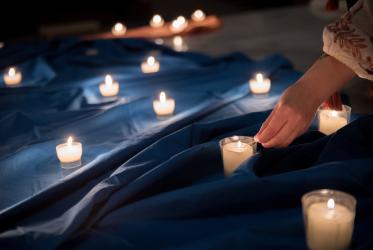National elections, gender-based violence, environmental issues and human rights in the Democratic Republic in Congo (DRC) were in focus during a two-day forum organized by the member churches of the World Council of Churches (WCC) in the DRC.
At the forum, titled “Pilgrimage of justice and peace: Reflections on peace-building and community rehabilitation in DRC”, Congolese churches discussed outcomes related to the DRC arising from the WCC 10th Assembly in South Korea last year, which adopted a Minute on the situation of the DRC. While sharing about issues of concern for DRC, forum participants identified priority areas of work for the churches at the national, regional and international level.
A delegation headed by the WCC general secretary Rev. Dr Olav Fykse Tveit attended the forum in the DRC from 29 and 30 April. The delegation was in DRC visiting WCC member churches and ecumenical partners.
The forum participants highlighted the need for accompanying Congolese people through civic education and monitoring in the coming elections in 2016. Fr Apollinaire M. Malumalu, president of the National Electoral Independent Commission in DRC, spoke during the forum and welcomed participation from the WCC related to civic education and monitoring of the elections.
“In order to secure confidence and trust in the upcoming elections, the ecumenical family must accompany the Congolese churches as they prepare for the forthcoming elections. This is vital to ensure the stability of the country in future, as peaceful elections can pave the way for lasting peace and justice in DRC,” said WCC general secretary Tveit.
At the forum, issues of gender-based violence were discussed, including use of rape as a weapon of war during the armed conflicts in the Eastern provinces of DRC. It was said that rape has been systematically used as a means to humiliate and degrade victims as well as entire villages, leading to retaliation and endless cycles of violence. It was reported that victims of such atrocities are often stigmatized and cornered by society.
The discussions also linked gender-based violence to the high prevalence of HIV and AIDS and how it affects women and girls, who are often faced with discrimination.
The participants also discussed environmental protection and management of the DRC’s rich and diverse natural resources and the state of human rights. They pointed out the contradiction between the potential wealth of the country and the current level of poverty among country’s population. Corruption and the greed of multinationals were identified as some of the reasons behind the prevalence of insecurity and plundering of natural resources.
In his message, Tveit praised the “strength and endurance of churches in the DRC”. He affirmed the WCC’s commitment to “stand in solidarity with the Congolese churches and work with them as part of the pilgrimage for justice and peace”. He encouraged the “churches to journey together in a spirit of mutual support”.
“I believe that God will make DRC an example of ecumenical cooperation”, Tveit added.
WCC general secretary speaks on themes of justice and peace in DRC (WCC news release of 29 April 2014)
WCC Assembly Minute on the Situation in Democratic Republic of Congo






